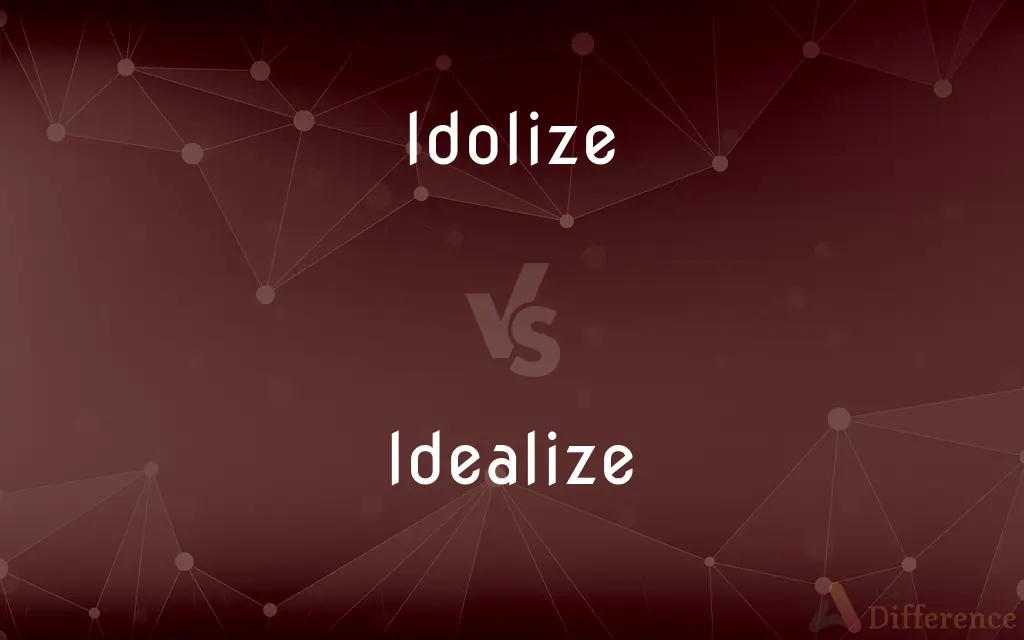Idolize vs. Idealize — What's the Difference?
Edited by Tayyaba Rehman — By Urooj Arif — Updated on April 29, 2024
Idolize involves adoring or revering someone excessively, often overlooking faults, whereas idealize involves envisioning someone or something as perfect, often ignoring reality.

Difference Between Idolize and Idealize
Table of Contents
ADVERTISEMENT
Key Differences
Idolizing someone involves placing them on a pedestal due to admiration or devotion, often focusing on their public image or specific traits. On the other hand, idealizing someone means attributing perfect qualities to them, which may not align with their actual characteristics. This process often includes a distortion of reality to fit a personal or societal ideal.
When people idolize celebrities, they may imitate their styles or lifestyles, focusing intensely on their every action. Whereas, idealizing involves creating an often unattainable standard that can apply to concepts or individuals, leading to unrealistic expectations.
Idolization can lead to a deep emotional attachment to the idol, sometimes resulting in intense fandom or hero worship. Conversely, idealization might result in disappointment when the idealized person or concept fails to meet the high standards set by the admirer.
In idolization, the focus is on the actual qualities of the person, which are exaggerated or highly celebrated. On the other hand, idealization involves projecting desired qualities onto a person or thing, often ignoring their true nature.
While idolization is commonly seen in relationships between fans and celebrities, idealization is often observed in romantic relationships, where one partner may perceive the other as 'perfect'.
ADVERTISEMENT
Comparison Chart
Definition
Excessive admiration and reverence
Conceiving something as perfect
Focus
On actual qualities, exaggerated
On projected, often nonexistent qualities
Common Contexts
Celebrity worship, fandom
Romantic relationships, philosophical ideals
Emotional Consequence
Attachment, hero worship
Disappointment, unrealistic expectations
Reality Perception
Overlooking faults, idealizing aspects
Distortion or denial of reality
Compare with Definitions
Idolize
To glorify or exalt.
The documentary idolized the revolutionary leader's achievements.
Idealize
To elevate something in perfection.
Literature often idealizes heroic acts.
Idolize
To regard with blind adoration.
Fans idolize pop stars, often ignoring their flaws.
Idealize
To envision ideally, often unrealistically.
She idealized their relationship, ignoring obvious problems.
Idolize
To worship as a deity.
Ancient cultures idolized natural elements like the sun and moon.
Idealize
To represent in an ideal form.
The artist idealizes beauty in her paintings.
Idolize
To admire intensely and often uncritically.
She idolizes her father, seeing him as a flawless hero.
Idealize
To romanticize or fantasize.
Teenagers often idealize celebrity lifestyles.
Idolize
To be excessively devoted to.
He idolizes vintage cars, spending every weekend at car shows.
Idealize
To consider perfect or ideal.
He idealizes life in the countryside, thinking it's always peaceful.
Idolize
To regard with great or uncritical admiration or devotion.
Idealize
To regard or represent as ideal
Students who idealize their professors.
A book that idealizes rustic living.
Idolize
To make an idol of, or to worship as an idol.
Idealize
To regard or represent something as ideal.
Idolize
To adore excessively; to revere immoderately.
Idealize
(transitive) To regard something as ideal.
Idolize
To make an idol of; to pay idolatrous worship to; as, to idolize the sacred bull in Egypt.
Idealize
(intransitive) To conceive or form an ideal.
Idolize
To love to excess; to love or reverence to adoration; as, to idolize gold, children, a hero.
Idealize
To portray using idealization.
Idolize
To practice idolatry.
To idolize after the manner of Egypt.
Idealize
To make ideal; to consider as ideal; to give an ideal form or value to; to attribute ideal characteristics and excellences to; as, to idealize real life.
Idolize
Love unquestioningly and uncritically or to excess; venerate as an idol;
Many teenagers idolized the Beatles
Idealize
To treat in an ideal manner. See Idealization, 2.
Idealize
To form ideals.
Idealize
To form ideals.
Idealize
Consider or render as ideal;
She idealized her husband after his death
Idealize
Form ideals;
Man has always idealized
Common Curiosities
What does it mean to idealize someone?
Idealizing someone involves seeing them as perfect or nearly perfect, often ignoring the reality of who they are.
How do idolization and idealization affect personal perception?
Both can distort one's perception, with idolization focusing on exaggerated positives and idealization on projected ideals.
Why do people idealize in relationships?
People often idealize in relationships to align their perception of a partner with their desires or dreams.
What roles do idolization and idealization play in media?
Media often promotes both, creating idealized images of life and celebrity that can influence public expectations and behaviors.
Are there any positive aspects of idolizing?
Idolizing can sometimes inspire individuals to improve themselves or achieve great things.
What does it mean to idolize someone?
Idolizing someone means excessively admiring them, often ignoring their flaws.
Is idealizing common in relationships?
Yes, idealizing is common in romantic relationships where one might view the partner as flawless, which can lead to disappointment.
How do cultures influence idolization?
Cultural factors can dictate whom people idolize, often based on societal values like success, beauty, or power.
Can idolizing someone be harmful?
Yes, idolizing can be harmful as it might prevent seeing the person's real faults and lead to unrealistic expectations.
Can idealizing affect one's mental health?
Yes, idealizing can lead to mental health issues when individuals constantly face disappointment due to unrealistic expectations.
Can idolization affect personal relationships?
Yes, idolization can lead to one-sided relationships where one person is seen as superior, affecting interpersonal dynamics.
How do children and teenagers react to idolization?
Children and teenagers might idolize role models or celebrities, which can shape their aspirations and behaviors.
Is it possible to stop idealizing someone?
Yes, through self-awareness and realistic assessments, one can learn to see others more objectively.
What psychological factors drive idealization?
Psychological factors like desire for perfection and avoidance of reality can drive idealization.
How does society benefit from idolization or idealization?
While often problematic, these phenomena can motivate cultural unity and aspiration toward high standards in certain contexts.
Share Your Discovery

Previous Comparison
Mistranscribe vs. Mistranscribed
Next Comparison
Diaconate vs. DeaconAuthor Spotlight
Written by
Urooj ArifUrooj is a skilled content writer at Ask Difference, known for her exceptional ability to simplify complex topics into engaging and informative content. With a passion for research and a flair for clear, concise writing, she consistently delivers articles that resonate with our diverse audience.
Edited by
Tayyaba RehmanTayyaba Rehman is a distinguished writer, currently serving as a primary contributor to askdifference.com. As a researcher in semantics and etymology, Tayyaba's passion for the complexity of languages and their distinctions has found a perfect home on the platform. Tayyaba delves into the intricacies of language, distinguishing between commonly confused words and phrases, thereby providing clarity for readers worldwide.
















































